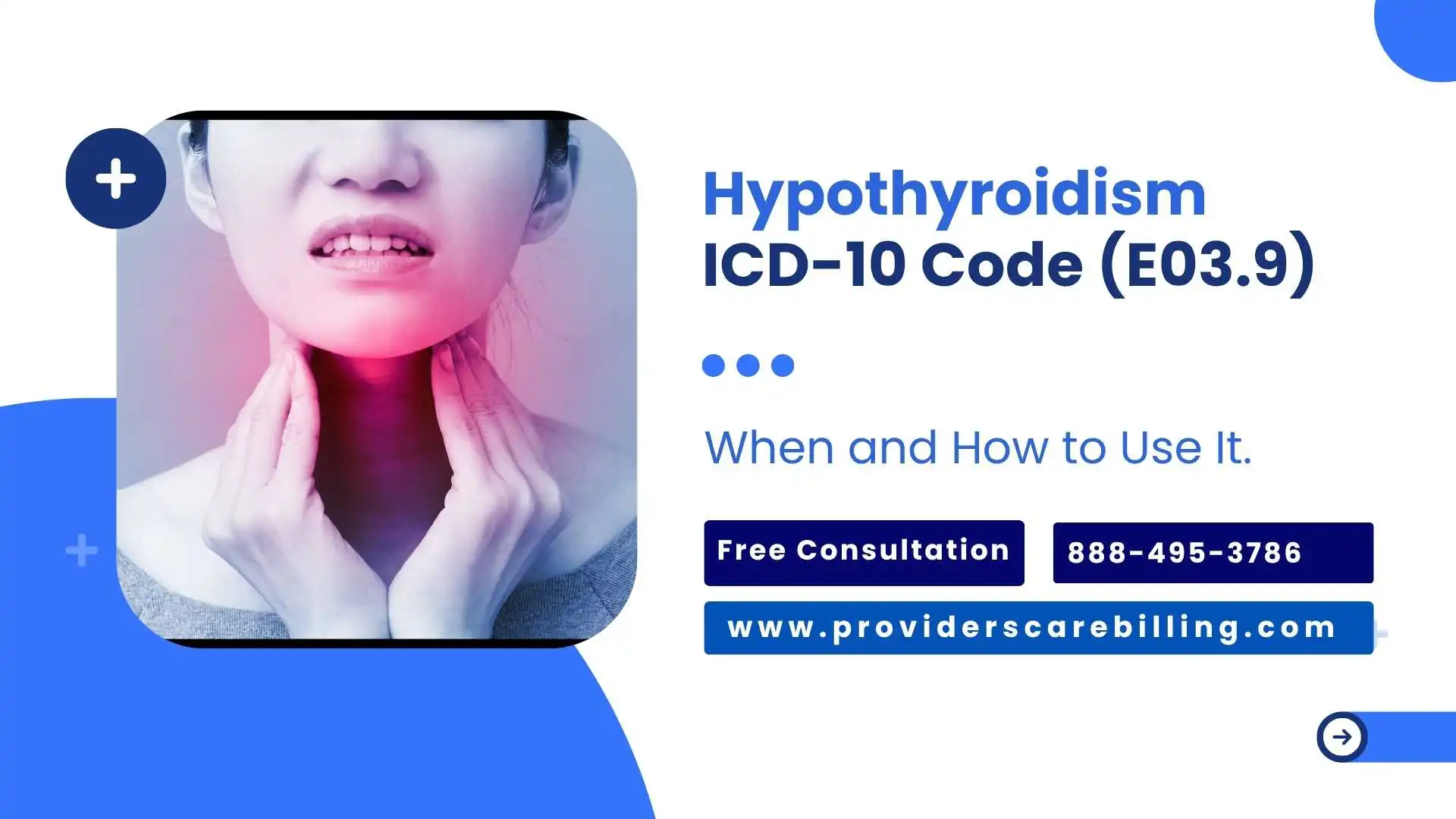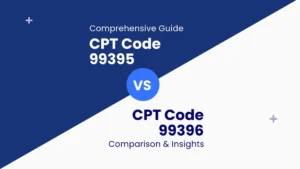According to the American Thyroid Association, an estimated 12% of US population will develop a thyroid condition during their lifetime.
Most of this Condition is documented under ICD-10 Code E03.9.
Hypothyroidism is a common endocrine disease which occurs when the thyroid gland doesn’t produce enough hormones which affects the body’s natural metabolism. It is a common disease in women and older people.
In medical billing and documentation, it is necessary to use the right hypothyroidism ICD-10 code. It is a crucial step for reporting and drug reimbursement. This blog will help us learn about some particular ICD-10 codes used for hypothyroidism and when to apply the codes that are associated with the low T4 levels (a thyroid hormone).
What is the ICD-10 Code for Hypothyroidism?
When a patient reports about fatigue or feeling cold, then he/she may have hypothyroidism. That is, their thyroid gland is not synthesizing sufficient hormones and it is influencing their body. If that’s the case and there is no specific reason of why it happened…Then the most appropriate code to use is E03.9.
Hypothyroidism can also be documented as
- ICD 10 e03.9
- e03 9
- e03.9 ICD 10
E03.9 is used as a standard DX code by healthcare providers when referring to hypothyroidism without stating the underlying cause (surgery, medication, autoimmune disease, such as Hashimoto thyroiditis). This is why it is a default code in most of the regular hypothyroid diagnoses unless additional details are present.
When is ICD-10 Code (E03.9) Used?
It is usually applied to general cases…When the thyroid is underactive, but there is no apparent reason, like surgery or any autoimmune disease. This code is often used when lab results show:
- High Levels of TSH (Thyroid Stimulating Hormone)
- Low Free T4 levels
These findings indicate hypothyroidism, but it has to be documented with a specific cause. If not, E03.9 is the right code to use.
Do not use E03.9 if the patient has:
- Thyroid Hormone Deficiency Since Birth
- Underactive Thyroid Due to Thyroidectomy
- A known cause, like Hashimoto’s thyroiditis or radiation-induced thyroid issues
When this is the case, you can use a more specific ICD-10 Code, which we will discuss later in this blog.
ICD-10 Codes & A Few Causes of Hypothyroidism
Hypothyroidism is caused by several different diseases and each of them has got a certain ICD-10 code. These codes help in making correct diagnosis, billing and taking care of the patient.
| Condition | ICD-10 Code | Description |
| Primary hypothyroidism | E03.9 | Hypothyroidism, unspecified (No known or recorded cause) |
| Hashimoto’s thyroiditis | E06.3 | Autoimmune thyroiditis (commonly referred to as Hashimoto’s) |
| Hypothyroidism due to Hashimoto’s | E03.9 + E06.3* | Underactive thyroid due to Autoimmune Cause |
| Post-thyroidectomy hypothyroidism | E89.0 | Postprocedural hypothyroidism (Result of Thyroid Gland Surgery) |
| Pregnancy-related hypothyroidism | O99.285 | Hypothyroidism Diagnosed during Early Pregnancy |
Note: Some providers also use both E03.9 and E06.3 to document the cause + condition when documentation supports it.
O99.28x changes with the trimester:
- O99.281: First trimester
- O99.282: Second trimester
- O99.283: Third trimester
- O99.285: Unspecified trimester
Related ICD-10 Codes for Hypothyroidism
Although the most common ICD-10 code used in the treatment of hypothyroidism is E03.9, other codes can be used depending on the cause or diagnosis.
- EE03.4 – Atrophy of the Thyroid
- E03.5 – Myxedema coma
- E03.8 – Other specified hypothyroidism
- E03.9 – Hypothyroidism, unspecified (No Specific Cause in Medical Records)
Besides these, you can also come across related endocrine codes, particularly when the lab results are concerned…
- ICD-10 code for TSH (High Level of Thyroid Stimulating Hormone)
- ICD-10 code for low T4 (Low Levels of Thyroid Stimulating Hormone)
- E07.9 – Disorder of thyroid, unspecified
Some Tips for Accurate Billing and Documentation
If you want to code Hypothyroidism properly, then you must add all the documents related to its diagnosis. Here’s what you should always include in the patient’s medical records.
Lab Reports – Make sure to document all tests that are related to the thyroid function(TSH or Free T4 levels)
Symptoms – The Most Common symptoms of hypothyroidism include fatigue, weight gain, dry skin, and cold intolerance.
Patient Medical History – Report any Patient history of thyroidectomy, radiation therapy, or of autoimmune thyroid diseases such as Hashimoto thyroiditis.
Important Note: In cases when, the cause of Hypothyroidism is known exactly then it is advisable to not use the ICD-Code E03.9, Hypothyroidism, unspecified (No known or recorded cause).
A Real Life Example to Make Things Much Clearer…
Let’s say a 45-year-old patient visits the clinic complaining about fatigue, weight gain or feeling cold. Lab tests also show high TSH and low Free T4 levels – making the chances of Hypothyroidism more clear.
The Patient has no documented cause, like surgery or any mention of any autoimmune disease. So here’s what you should do…
E03.9 (Since there is no specific cause known at the time)
Later, the patient, medical records show that he/she had a thyroidectomy(4 years ago). Now you will use…
E89.0 (Postprocedural hypothyroidism) Further testing and a referral to an endocrinologist confirm that the patient has Hashimoto’s thyroiditis. With this update, the most accurate code will be…E06.3 (Autoimmune thyroiditis).
The Difference of ICD-10 and CPT codes in Hypothyroidism
Here is the simple distinction between ICD-10 and CPT Codes that you should know of in case you are keen on making your life free of claim denials and reimbursement concerns.
ICD-10 Codes:
ICD-10 Codes are used in documentation for diagnosis. For Example:
- E03.9 – Hypothyroidism, unspecified (If the cause of hypothyroidism is not known yet.)
There are also other ICD-10 codes that we have discussed above.
CPT Codes:
CPT Codes are used for billing procedures and other services like lab tests, during the diagnosis. Here are some CPT Codes related to Hypothyroidism.
- 99213–99215 – Office visit codes for established patients
- 84443 – TSH Test (A Test for Thyroid Stimulating Hormone)
- 80050 – General health panel (It may include TSH, CBC, CMP)
Are there Any Updates in 2025 related to ICD-10 Coding 2025?
Yes, this is correct that CMS and WHO updated these codes annually, to make things more clear and better. But as of June 2025, there haven’t been any changes (E03.9 remains valid in 2025). It is important to keep up with the annual updates…this will minimize the chances of any lost claims and make your clinical practice better.
Now we know this is too much for a single person to do…
Why not leave it to the professionals? Get In Touch with our Team and let us handle this for you.
FAQs
What is the ICD-10 code of hypothyroidism?
E03.9 is the most commonly used ICD-10 code of Hypothyroidism. The code is applied in case the Patient has deficient thyroid hormone, however, no particular reason is recorded in the patient history..
What is the situation when I should use a more specific code than E03.9?
E03.9 is only applicable in case the cause is not known. The condition of the patient may be due to a particular reason, i.e. congenital problems or postoperative thyroid, and in this case, you are expected to use more specific codes like (E06.3), (E89.0) or (E03.0).
What is the DX code of Hashimoto-induced hypothyroidism?
In which the hypothyroidism is attributed to Hashimoto thyroiditis, the major code will be E06.3 – Autoimmune thyroiditis, but some providers might add either E03.9 or E03.8, although E06.3 is usually an indication of the autoimmune nature. Payer or institutional coding rules should always be followed when multiple codes are used.
What is the ICD-10 code for high TSH/low T4?
Results of a laboratory investigation such as high TSH or low T,4 do not have their own ICD-10 code, because they are not diagnosed. This rather, is an indication of hypothyroidism which can be coded by E03.9 or a more specific code, depending on the case of the clinical scenario. The lab tests are charged on its own using the CPT codes of 84443 to include TSH tests.
Since hypothyroidism can sometimes present alongside mood disorders like depression, it’s helpful to also review ICD-10 Code F33.1 for Recurrent Major Depressive Disorder (MDD) to ensure comprehensive patient care and accurate billing when both conditions coexist.




